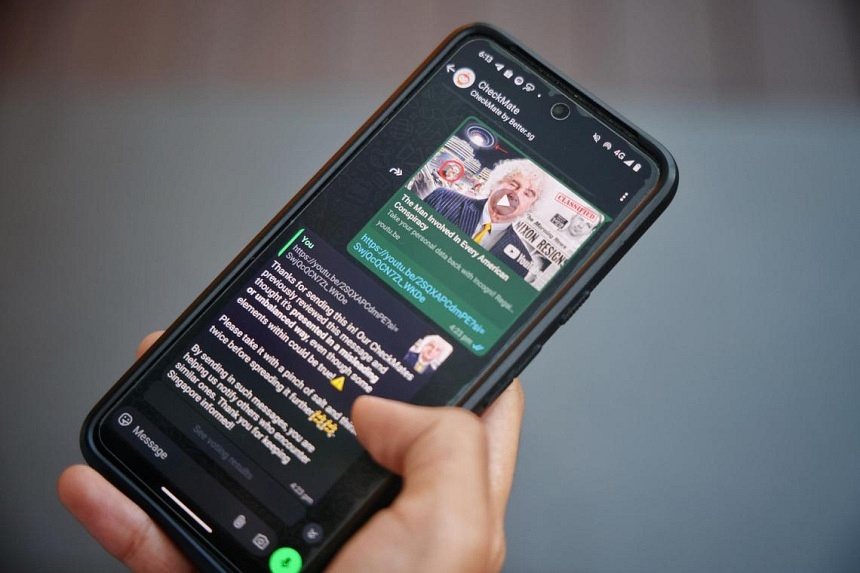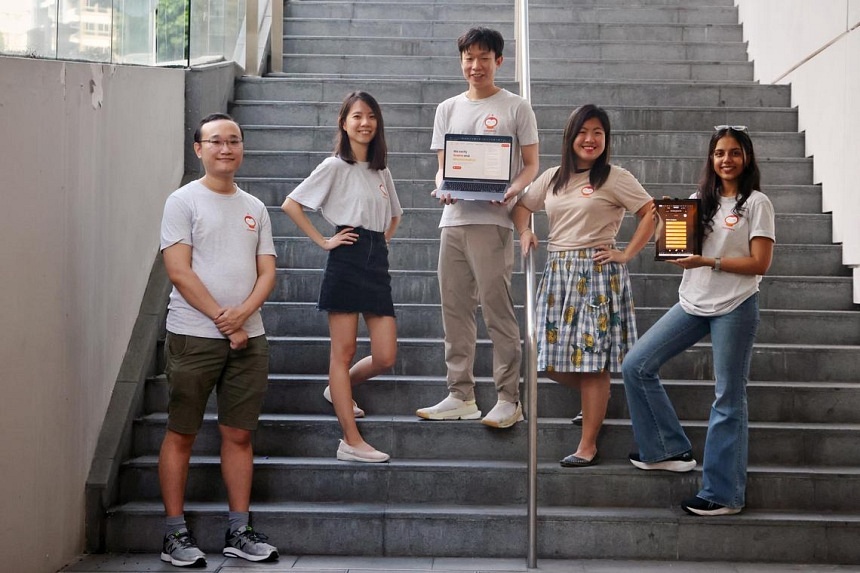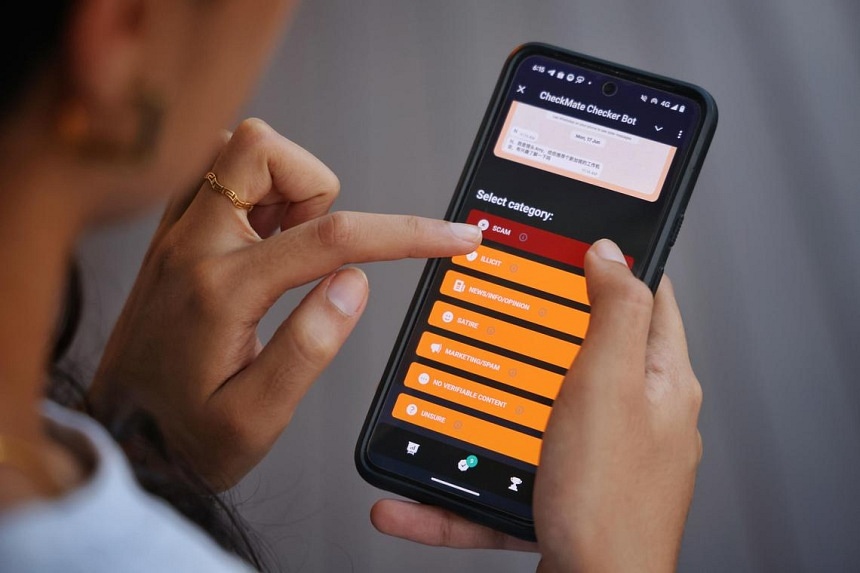Service that fact-checks WhatsApp messages hopes to double volunteers ahead of general election


SINGAPORE — An outfit of fact-checkers is enlisting artificial intelligence (AI) and calling for more volunteers to help verify news sent in by WhatsApp users, in anticipation of a surge in fake news in the lead-up to the general election in 2025.
CheckMate, a free fact-checking service launched in 2023, aims to at least double its pool of checkers to more than 100 volunteers.
In January 2025, it will also deploy generative AI in its WhatsApp chatbot to automate the detection of telltale signs of a scam or unreliable news, said founder Tan Bing Wen.
Tan, 35, who received the Government Technology Agency's Outstanding Citizen Contributor award in November for his work on CheckMate, said there is an urgent need to shore up ways to clarify lies that tend to spread like wildfire during key political events.
Fake news will not let up, if the falsehoods spread during the presidential campaign in 2023 and the widespread disinformation seen in 2024 in various elections worldwide are any indication, he said.
Days before President Tharman Shanmugaratnam won the election on Sept 1, 2023, hoax messages falsely claiming that presidential candidate Tan Kin Lian had won 60 per cent of the vote circulated online, said CheckMate's Tan, whose team debunked the claim by replying to users who had uploaded screenshots of these posts to CheckMate's WhatsApp service.
He said this was just one of several falsehoods that surfaced during the election, which included misinformation suggesting that Tharman's campaign symbol — a pineapple — was linked to the LGBTQ (lesbian, gay, bisexual, transgender and queer) community. In reality, the pineapple is recognised locally as a symbol of good fortune.
"We've dealt with one presidential election when we were much smaller. We will try and ramp up our number of fact-checkers before the (general) election, that's for sure," Tan said, in the hope that generative AI and more checkers will improve the speed and accuracy of the service.
Local fact-checking initiatives such as CheckMate, Black Dot Research and Factually have grown in number over the years to counter the spread of misinformation, allowing users to get alerted about prominent fake news or upload content to verify its credibility.
AI-powered tools like Facticity.AI, which in October was named one of Time magazine's best inventions of 2024, enable users to submit YouTube links or descriptions of content for assessment by AI on demand.
CheckMate aims to set its service apart by offering fact-checking via WhatsApp, to make it convenient for users to check suspicious messages or images using its chatbot before they forward these to others, said Tan.
Users can upload links or screenshots or forward text messages that they wish to check, and will usually receive a reply within an hour from a bot or volunteer, indicating whether the content should be viewed with scepticism.

The service is intended to provide a quick assessment, Tan explained, noting that offering detailed justifications for each query would be too time- and resource-intensive.
"We trade off detail for speed. Giving an indication, rather than full justification, is more effective to stop them (people) from being tricked quickly."
Whenever flagged content is received, CheckMate's volunteers verify it against trusted news or official sources or forums and advise on its credibility, said Tan.
"The work we do is not magic," he said. "These are basic checks our volunteers perform to provide users with assurance about what they are reading, as many people typically don't bother to verify information."
The AI that is being built will automate the detection of fake content using the reasoning abilities of large language models that can also tap the latest information online.
The advanced AI can weigh the reliability of information and even assess the content's tone and writing style, said Tan, an AI engineer in his day job.
The team will use the bot to deliver quick responses to users submitting content for checks.
The bot is an improvement over the basic AI model CheckMate now uses, which is limited to spotting only scam content that is similar to what has been flagged earlier by others.
The use of AI will raise computing costs, which Tan is currently covering out of his own pocket. He added that he is exploring options to make the service more sustainable.
Since its official launch in 2023, CheckMate has helped more than 2,700 users check at least 3,400 messages, said Tan, whose inspiration for the project came after seeing falsehoods about Covid-19 vaccines spread widely online, especially on WhatsApp.
More fact-checkers will be needed to improve the accuracy of checks and to handle more cases that are expected in 2025, said Tan, adding that his team will participate in more roadshows to raise awareness of disinformation and double the number of volunteers to at least 100 active members.
The group's fact-checkers are unpaid volunteers who are notified about new fact-checking requests and can choose to handle them at their discretion.

Members of the public are welcome to volunteer but will first have to pass an entry test, which quizzes them on how to spot disinformation and educates them on basic fact-checking principles.
Despite the advances of AI, human judgment remains crucial to the service as this allows for intuitive assessments of flagged cases, said Tan. In instances like election-related news, not all flagged content is widely reported and it often involves nuances that AI may overlook.
Volunteers will continue to review the bot's replies soon after they are sent and provide clarifications to users if necessary. With more volunteers, answers provided to users will be more representative, based on the wisdom of the crowd, said Tan.
It is unlikely that traditional news sources will devote resources to writing stories to clarify every untruth circulating online unless the content becomes widespread, said Tan.
"But fake news is happening and if users don't get a quick clarification, they might be misled to think this is real."
The authorities in Singapore are putting more resources into tackling online falsehoods in the light of more disinformation campaigns being seen globally and technological advances that could make fabricated content like deepfakes harder to spot.
Legislation like the Foreign Interference (Countermeasures) Act (Fica) and Protection from Online Falsehoods and Manipulation Act have been enlisted to help crack down on disinformation.
Recently, 10 websites linked to foreign actors that could potentially be used to carry out disinformation campaigns against Singapore were blocked under Fica.
Anonymous sources have also targeted Singapore audiences with deepfakes of politicians promoting investment products, among other false claims.
CheckMate has received the support of major organisations like the National Library Board and the Centre for Advanced Technologies in Online Safety — launched in May with $50 million in backing to tackle online harms here — that have offered the group roadshow and networking opportunities, which Tan hopes can help grow public awareness of its service and boost recruitment.

Ken Chen, 33, has been volunteering with CheckMate since 2023, after he encountered its work at a showcase.
He reviews up to 20 flagged posts weekly for CheckMate. His role is to evaluate the source of each piece of content and indicate the possible nature of the content — such as whether it is likely to be misleading, is satirical or should be taken with a pinch of salt.
He said the widespread misinformation during the Covid-19 pandemic left a lasting impression about fake news. "It made the whole situation very confusing, so I felt a platform like this would be a good tool for the public to use."
This article was first published in The Straits Times. Permission required for reproduction.